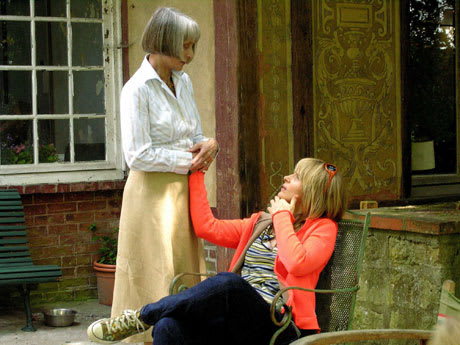Olivier Assayas' recent projects haven't quite set the world on fire the way they did back in his Irma Vep days. That should change with this solid rebound, which while perhaps not on a par with his masterpieces is a quantum leap ahead of some of his more indifferent work.
When the matriarch of a wealthy bourgeois family dies, her children are left to deal with the inheritance and the beloved estate that now must either be divided up or sold. The country house and attached objects are sort of the cultural memory of a vanished French culture - art and design of an austere old order that's being left behind by the modern age.
The older son (Charles Berling) is the only one who wants to keep things as they are, while his sister (Juliet Binoche) is occupied by personal issues and his younger brother (Jeremie Renier) is too distanced in time from these treasures and their values. Personal memory and national heritage must give way to the march of economics and the winds of "progress," which dovetails nicely with Assayas' other movies, though not without bumps.
The director deftly manages to keep the film from being Merchant Ivory posh but his ambivalence about the new modern order is more class-conscious than his lefty instincts are telling him. Conversely, the Renier character is too cold, with the coldness clumsily linked to his pro-globalization stance. Still, it's got perception and heartbreaking passages, with an amazing final movement that will erase all misgivings.
In throwing the current generation against the disappointments of lost time, Assayas gives us a generous ending as beautiful as it is bittersweet.
(Seville)When the matriarch of a wealthy bourgeois family dies, her children are left to deal with the inheritance and the beloved estate that now must either be divided up or sold. The country house and attached objects are sort of the cultural memory of a vanished French culture - art and design of an austere old order that's being left behind by the modern age.
The older son (Charles Berling) is the only one who wants to keep things as they are, while his sister (Juliet Binoche) is occupied by personal issues and his younger brother (Jeremie Renier) is too distanced in time from these treasures and their values. Personal memory and national heritage must give way to the march of economics and the winds of "progress," which dovetails nicely with Assayas' other movies, though not without bumps.
The director deftly manages to keep the film from being Merchant Ivory posh but his ambivalence about the new modern order is more class-conscious than his lefty instincts are telling him. Conversely, the Renier character is too cold, with the coldness clumsily linked to his pro-globalization stance. Still, it's got perception and heartbreaking passages, with an amazing final movement that will erase all misgivings.
In throwing the current generation against the disappointments of lost time, Assayas gives us a generous ending as beautiful as it is bittersweet.
